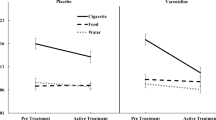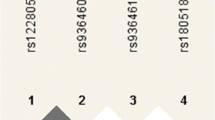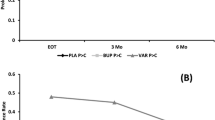Abstract
Rationale
Despite the high prevalence and public health significance of weight gain following smoking cessation, little is known about the underlying bio-behavioral mechanisms or effective therapies.
Objectives
We evaluated the effects of bupropion on food reward following smoking abstinence and the moderating influence of genotype.
Methods
Seventy-one smokers of European ancestry were genotyped for the dopamine D2 receptor (DRD2) Taq1 polymorphism and randomized to treatment with bupropion (300 mg) or placebo for smoking cessation. Subjects participated in two behavioral laboratory sessions during which the rewarding value of food was assessed using a behavioral economics measure: session 1 occurred prior to medication and before cessation of smoking; session 2 occurred following 3 weeks of medication and 1 week of sustained abstinence.
Results
Carriers of the DRD2 A1 minor allele exhibited significant increases in the rewarding value of food following abstinence from smoking, and these effects were attenuated by bupropion treatment (P=0.03 for medication by genotype interaction). Further, higher levels of food reward at session 2 (post-quit) predicted a significant increase in weight by 6-month follow-up in the placebo group, but not in the bupropion-treated group (P=0.006 for medication by food reward interaction).
Conclusions
These results provide new evidence that the increase in body weight that occurs following smoking cessation is related to increases in food reward, and that food reward is partly determined by genetic factors. Bupropion’s efficacy in attenuating abstinence-induced weight gain may be attributable, in part, to decreasing food reward.


Similar content being viewed by others
References
Anderson JW, Greenway FL, Fujioka K, Gadde KM, McKenney J, O’Neil PM (2002) Bupropion SR enhances weight loss: a 48-week double-blind, placebo-controlled trial. Obes Res 10:633–641
Ascher J, Cole J, Colin J (1995) Bupropion: a review of its mechanism of antidepressant activity. J Clin Psychiatry 56:395–401
Berridge KC (1996) Food reward: brain substrates of wanting and liking. Neurosci Biobehav Rev 20:1–25
Devlin B, Roeder K (1999) Genomic control for association studies. Biometrics 55:997–1004
Di Chiara G, Imperato A (1988) Drugs abused by humans preferentially increase synaptic dopamine concentrations in the mesolimbic system of freely moving rats. Proc Natl Acad Sci U S A 85:5274–5278
Due DL, Huettel SA, Hall WG, Rubin DC (2002) Activation in mesolimbic and visuospatial neural circuits elicited by smoking cues: evidence from functional magnetic resonance imaging. Am J Psychiatry 159:954–960
Epstein L, Caggiula A, Perkins K, Mitchell S, Rodefer J (1992) Abstinence from smoking influences habituation to food cues. Physiol and Behav 52:641–646
Froom P, Melamed S, Benbassat J (1998) Smoking cessation and weight gain. J Fam Pract 46:460–464
Gilbert RM, Pope MA (1982) Early effects of quitting smoking. Psychopharmacology 78:121–127
Griffiths RR, Rush CR, Puhala KA (1996) Validation of the multiple-choice procedure for investigating drug reinforcement in humans. Exp Clin Psychopharmacol 4:97–106
Hall SM, Ginsberg D, Jones RT (1986) Smoking cessation and weight gain. J Consult Clin Psychol 54:342–346
Hall SM, McGee R, Tunstall C, Duffy J, Benowitz N (1989) Changes in food intake and activity after quitting smoking. J Consult Clin Psychol 57:81–86
Hatsukami D, LaBounty L, Hughes J, Laine D (1993) Effects of tobacco abstinence on food intake among cigarette smokers. Health Psychol 12:499–502
Heatherton T, Kozlowski L, Frecker R, Fagerstrom K (1991) The Fagerstrom test for nicotine dependence: a revision of the Fagerstrom tolerance questionnaire. Br J Addict 86:1119–1127
Hurt R, Sachs D, Glover E, Offord K, Johnston J, Dale L, et al (1997) A comparison of sustained-release bupropion and placebo for smoking cessation. N Engl J Med 337:1195–1202
Kenny PJ, Markou A (2001) Neurobiology of the nicotine withdrawal syndrome. Pharmacol Biochem Behav 70:531–549
Kos J, Hasenfratz M, Battig K (1997) Effects of a 2-day abstinence from smoking on dietary, cognitive, subjective, and physiologic parameters among younger and older female smokers. Physiol Behav 61:671–678
Lamb RJ, Griffiths RR (1990) Self-administration in baboons and the discriminative stimulus effects in rats of bupropion, nomifensine, diclofensine and imipramine. Psychopharmacology 102:183–190
Lappalainen R, Epstein LH (1990) A behavioral economics analysis of food choice in humans. Appetite 14:81–93
Leischow SJ, Stitzer ML (1991) Effects of smoking cessation on caloric intake and weight gain in an inpatient unit. Psychopharmacology 104:522–526
Lerman C, Caporaso NE, Audrain J, Main D, Bowman ED, Lockshin B, Boyd NR, Shields PG (1999) Evidence suggesting the role of specific genetic factors in cigarette smoking. Health Psychol 18:14–20
Lerman C, Roth D, Kaufmann V, Audrain J, Hawk L, Liu A, Niaura R, Epstein L (2002a) Mediating mechanisms for the impact of bupropion in smoking cessation treatment. Drug Alcohol Depend 67:219–223
Lerman C, Shields PG, Wileyto EP, Audrain J, Pinto A, Hawk L, Krishnan S, Niaura R, Epstein L (2002b) Pharmacogenetic investigation of smoking cessation treatment. Pharmacogenetics 12:627–634
Martel P, Fantino M (1996) Influence of the amount of food ingested on mesolimbic dopaminergic system activity: a microdialysis study. Pharmacol Biochem Behav 55:297–302
Meyers AW, Klesges RC, Winders SE, Ward KD, Peterson BA, Eck LH (1997) Are weight concerns predictive of smoking cessation? A prospective analysis. J Consult Clin Psychol 65:448–452
Millikan RC (2001) Re: Population stratification in epidemiologic studies of common genetic variants and cancer: quantification of bias. J Natl Cancer Inst 93:156–158
Mizes JS, Slaon DM, Segraves K, Spring B, Pingitore R, Kristeller J (1998) The influence of weight related variables on smoking cessation. Behav Ther 29:371–385
Nides M, Rand C, Dolce J, Murray R, O’Hara P, Voelker H, Connett J (1994) Weight gain as a function of smoking cessation and 2-mg nicotine gum use among middle-aged smokers with mild lung impairment in the first 2 years of the lung health study. Health Psychol 13:354–361
Noble EP, Blum K, Ritchie T, Montgomery A, Sheridan PJ (1991) Allelic association of the D2 dopamine receptor gene with receptor-binding characteristics in alcoholism. Arch Gen Psychiatry 48:648–654
Ogden J (1994) Effects of smoking cessation, restrained eating, and motivational states on food intake in the laboratory. Health Psychol 13:114–121
Perkins KA, Epstein LH, Fonte C, Mitchell SL, Grobe JE (1995) Gender, dietary restraint, and smoking’s influence on hunger and the reinforcing value of food. Physiol Behav 57:675–680
Perkins KA, Epstein LH, Marks BL, Stiller RL, Jacob RG (1989) The effect of nicotine on energy expenditure during light physical activity. N Engl J Med 320:898–903
Perkins KA, Levine MD, Marcus MD, Shiffman S (1997) Addressing women’s concerns about weight gain due to smoking cessation. J Subst Abuse Treat 14:173–182
Reiss S, Havercamp S (1996) The sensitivity theory of motivation: implications for psychopathology. Behav Res Ther 34:621–632
Robinson TE, Berridge KC (1993) The neural basis of drug craving: an incentive-sensitization theory of addiction. Brain Res Brain Res Rev 18:247–291
Saelens BE, Epstein LH (1996) Reinforcing value of food in obese and non-obese women. Appetite 27:41–50
Smith JA, Epstein LH (1991) Behavioral economic analysis of food choice in obese children. Appetite 17:91–95
Society for Research on Nicotine & Tobacco Subcommittee on Biochemical Verification (2002) Biochemical verification of tobacco use and cessation, Nicotine Tob Res 4:149–159
Stunkard AJ, Messick S (1985) The three-factor eating questionnaire to measure dietary restraint, disinhibition and hunger. J Psychosom Res 29:71–83
Tella SR, Ladenheim B, Cadet JL (1997) Differential regulation of dopamine transporter after chronic self-administration of bupropion and nomifensine. J Pharmacol Exp Ther 281:508–513
Thompson J, Thomas N, Singleton A, Piggott M, Lloyd S, Perry EK, Morris CM, Perry RH, Ferrier IN, Court JA (1997) D2 dopamine receptor gene (DRD2) Taq1 A polymorphism: reduced dopamine D2 receptor binding in the human striatum associated with the A1 allele. Pharmacogenetics 7:479–484
USDHHS (1990) The health benefits of smoking cessation. A report of the surgeon general. US Department of Health Services, Public Health Service, Centers for Disease Control, Center for Chronic Disease Prevention and Health Promotion, Office on Smoking and Health, Atlanta, pp 309
Volkow ND, Wang GJ, Fowler JS, Logan J, Jayne M, Franceschi D, Wong C, Gatley SJ, Gifford AN, Ding YS, Pappas N (2002) “Nonhedonic” food motivation in humans involves dopamine in the dorsal striatum and methylphenidate amplifies this effect. Synapse 44:175–180
Wacholder S, Rothman N, Caporaso N (2000) Population stratification in epidemiologic studies of common genetic variants and cancer: quantification of bias. J Nat Cancer Inst 92:1151–1158
Wang GJ, Volkow ND, Logan J, Pappas NR, Wong CT, Zhu W, Netusil N, Fowler JS (2001) Brain dopamine and obesity. Lancet 357:354–357
Acknowledgments
The authors gratefully acknowledge Jodie Jaroni, M.S., for assistance with research coordination, Bridget Ambrose, B.A., and Fran Saad, B.A., for data collection, and David Main, M.A., M.S., and Rocco Paluch, M.S., for data management. The current study complied with the current laws of the United States of America. This research was supported by grants from the National Cancer Institute RO1CA63562 and the National Institute on Drug Abuse P50CA/DA84718, and funds from the Abramson Cancer Center and Annenburg Public Policy Center (C.L.).
Author information
Authors and Affiliations
Corresponding author
Rights and permissions
About this article
Cite this article
Lerman, C., Berrettini, W., Pinto, A. et al. Changes in food reward following smoking cessation: a pharmacogenetic investigation. Psychopharmacology 174, 571–577 (2004). https://doi.org/10.1007/s00213-004-1823-9
Received:
Accepted:
Published:
Issue Date:
DOI: https://doi.org/10.1007/s00213-004-1823-9




